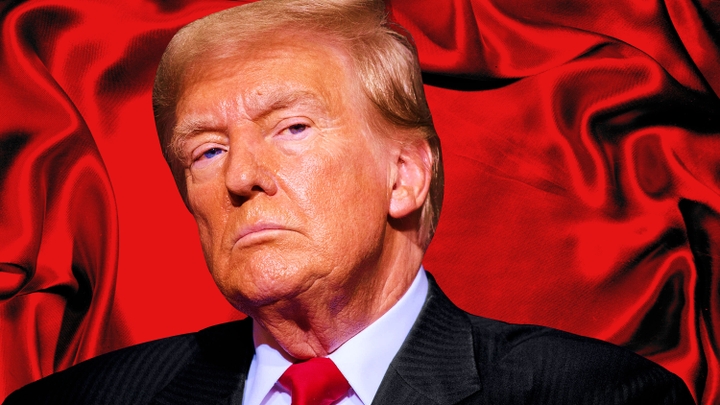From Jocelyn Sze at Huffpost:
I'm A Psychologist Who Specializes In Narcissists. Here's What We Need To Do To Stop Trump.
"The same patterns that destabilize families destabilize democracies."
The Trump administration is planning a June 14 military parade to celebrate the 250th anniversary of the U.S. Army — and the president's 79th birthday. When your sense of self-exaltation requires tanks, flyovers and up to $45 million for a birthday party, we're no longer in the realm of cake and candles — we're squarely in Criterion 1 of narcissistic personality disorder: "a grandiose sense of self-importance."
To be clear, I can't diagnose the president or any public figure without personal examination. But research shows that those in positions of power, especially in politics, are more likely to exhibit traits of grandiose narcissism. When narcissistic control seeps into leadership, it distorts truth, erodes trust and destabilizes institutions. The more we understand these dynamics, the better we can protect both the public and the health of our democracy.
As a clinical psychologist who works with trauma and narcissistic abuse, I see echoes of this dynamic every day in my therapy office. The same patterns that destabilize families destabilize democracies: along with the magnetic vision of the grandiose narcissist come denial, attack, reversal of blame and emotional chaos.
I think of one of my patients when she discovered her brother was terrorizing their elderly mother with violent threats and financial abuse. When she named the harm, he flipped the script — denying everything and accusing her of being unstable, all while fiercely protecting his "golden boy" image. Under family pressure to stay quiet, she spiraled into rumination. But armed with awareness and support, she stood firm. Like a broken record, she calmly named the harm until her boundary held. It came at a cost, but her brother was eventually removed from their mother's home.
This same pattern shows up, magnified, on the political stage. Narcissistic control in government thrives on flipping the script and silencing watchdogs.
Authoritarian leaders, like narcissistic family members, rely on well-worn tactics to manufacture a psychological state of volatile uncertainty — where outcomes aren't just unknown, but constantly shifting and unpredictable. This overwhelms the brain's ability to anticipate and prepare, keeping people mentally off-balance and easier to control. The good news: Awareness works like a vaccine, gradually building psychological immunity against further harm.
For another patient, "moving the goalposts" was the favored tactic of her ex-boyfriend to generate such volatility. He would make a demand (under the guise of "improving her") and then change the expectation once it was met. In government, this looks like constantly reversing policies or public positions so that citizens, the media and allies remain unmoored.
"The White House has no idea what it's doing on tariffs and keeps flip-flopping… Why even do an exemption if you're going to reverse it soon?" Rep. Ted Lieu (D-Calif.) posted on X on April 13, referring to more than 50 flip-flops on tariff policies since Trump's inauguration.
Many dismiss these reversals as mere incompetence or poor strategy — and it's true that narcissism is associated with more impulsive, error-prone decision-making. But anyone familiar with narcissistic abuse understands the deeper maneuver: Whether consciously or not, narcissists hold power by keeping others in a state of psychological whiplash. And it works.
At its core, emotional control is the narcissist's primary goal: to protect a fragile sense of self-importance and entitlement by maintaining the grand illusion that supports it — without empathy for others. While it's important to note that narcissistic pathology by no means equates to abuse, there are more aggressive versions that use confusion, despair and emotional bonds like loyalty to control how others think and feel, secure a constant flow of admiration or reactivity, shield themselves from shame and keep others attached — even against their best interests.
Of the dizzying array of tactics, perhaps the most effective is crisis manufacturing. The constant emergencies aren't flukes — they're by design. They keep everyone in survival mode, distracting from deeper issues and ensuring the narcissist stays at the center of attention and control. For my patients who have survived narcissistic abuse, it might be an explosive tantrum, a threat to seek full custody or a frantic late-night call about a (fabricated) mugging. On the national stage, it takes the form of rhetorical escalations, legal threats or emergency declarations designed to dominate the news cycle and overwhelm opposition.
The nervous system can only take so much. Fight (rage), flight (escape planning), freeze (paralysis), fawn (capitulation) and flop (hopelessness) are natural survival responses — but they also keep us stuck. Healing — in therapy and in democracy — begins by recognizing when we're trapped in these states and learning how to return to grounded, organized action.
In my work, I help people identify and unwind these patterns. They begin to understand they're not just anxious or distracted for no reason — they're reacting to prolonged psychological coercion. The same is true for societies under narcissistic leadership. This isn't just politics. It's millions of nervous systems in fight-or-flight mode.
One of my patients responds to her mother's barrage of abusive texts — a stream of accusations, victim posturing, theatrical crises and financial demands — by reaching for her flashcards. Each card is labeled with a tactic she's learned to spot: Deny, Attack, Play the Victim, Perform the Hero, Create Crisis. Instead of being wrung out like a towel — her body drained of clarity by her mother's volatility — she names each tactic as it arises. Naming gives her distance. It helps her stay calm, grounded and in control of her response. The unpredictable becomes predictable. That's what psychological immunity looks like in real life.
I've watched many patients wrestle their way out of the fog of narcissistic control. It doesn't happen all at once. It begins with grieving what cannot be changed and focusing, with fierce clarity, on what remains within reach. It means reclaiming attention, setting boundaries and refusing to give your power to someone who thrives on your reactivity.
I'm also watching how this dynamic plays out in institutions. When law firms, universities or political bodies bend to powerful figures instead of upholding shared values, it mirrors what happens in abusive households: Everyone walks on eggshells. In such environments, self-protection becomes the priority, and choices are made not from alignment with values but from fear.
But recovery begins when people stop playing along or exhausting energy in cycles of infighting. Instead of spending precious bandwidth on disbelief or outrage, the goal is to name the tactic, call out the harm, cultivate trusted support and let go of what is beyond your control. Persistent engagement in shock, bargaining or rumination often reflects the mind's attempt to delay the grief associated with profound loss — private and emotional for my patients, social and institutional for our country.
When Dorothy pulled back the curtain and revealed the Wizard as an insecure man with a microphone and a smoke machine, she shattered the illusion that had kept an entire city captive. In therapy, that moment of recognition is just as powerful. Once someone sees the manipulation for what it is, the spell begins to break.
From a trauma psychologist's perspective, what can a nation do once the curtain is pulled back?
First: Stop enabling. Reactive efforts to clean up the damage often backfire, shielding narcissists from accountability and allowing them to retain influence. On a political level, this means pausing to strategize before rushing in to fix the narcissist's mess. Strategic restraint — like that practiced by House Minority Leader Hakeem Jeffries, who has been criticized for not "swinging at every pitch" — is not weakness. It's discipline.
One technique I teach is called "gray rocking": refusing to feed the narcissist's need for drama, attention or emotional reactivity. Gray rocking means becoming sturdy and repetitive — not reactive or maximalist — a boring target for someone addicted to power. Reacting with hyperbole or hysteria only emboldens narcissists. Deny them the fuel they seek. This is hard work. But it's how an abuser loses power.
Then: Set boundaries. In therapy, that might mean saying no repeatedly, like a broken record, and building the support system to stay safe. On a national scale, it means working together to reestablish constitutional guardrails such as due process, checks and balances, and freedom of speech. By using loopholes — like invoking 18th century wartime laws — to expand his power, Trump has exposed the weak spots in American democracy. As our founding documents remind us: "A Prince, whose character is thus marked by every act which may define a Tyrant, is unfit to be the ruler of a free People." The Constitution is not just a legal structure — it's psychological scaffolding against narcissistic control.
Build resilience. Narcissistic abuse isn't just dangerous and dysregulating — it feeds on the very distress and isolation it creates to sustain itself. To interrupt the cycle, we need practices that restore regulation and reinforce community power. Collective care and self-care are not luxuries — they are revolutionary acts in times of oppression. Rest is not retreat; it's how we recover the clarity and cohesion needed to mobilize and rebuild. Join hands. There is strength in numbers and safety in solidarity.
And above all, keep faith in the long game. While narcissistic dynamics rely on urgency and alarm, deep change comes from staying calm, clear and connected. In defending against narcissistic control, the answer is never to mimic harmful tactics — it is to recognize them, grieve their damage, stop enabling them and break out of reactivity. Boundaries, civic mobilization and long-haul strategy are how we begin to heal the democratic spirit. In both therapy and democracy, healing begins the moment we stop reacting and start remembering who we are.
Dr. Jocelyn Sze is a clinical psychologist who specializes in evidence-based treatment of PTSD and anxiety. She is an assistant clinical professor at University of California, Berkeley. She serves on the board of Bay Area Trauma Recovery Clinical Services, a nonprofit advancing trauma-focused training, research, and treatment, as well as the McCune Foundation, which supports grassroots organizations that empower and mobilize historically excluded populations. The expressed views are solely those of the author and do not represent those of her affiliations.


